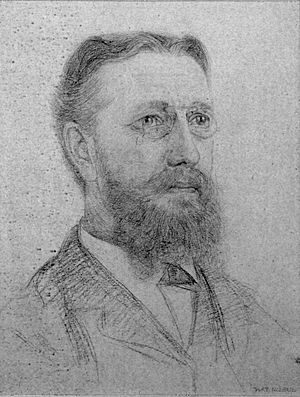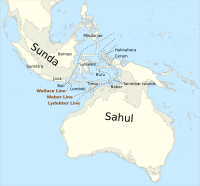Max Carl Wilhelm Weber facts for kids
Quick facts for kids
Max Carl Wilhelm Weber
|
|
|---|---|
 |
|
| Born | 5 December 1852 |
| Died | 7 February 1937 (aged 84) Eerbeek, Netherlands
|
| Nationality | German Dutch |
| Known for | Weber's Line |
| Spouse(s) | Anna Weber-van Bosse |
| Awards | Foreign Member of the Royal Society |
| Scientific career | |
| Institutions | University of Utrecht, University of Amsterdam, University of Bonn, Humboldt University |
| Author abbrev. (zoology) | Weber |
Max Carl Wilhelm Weber van Bosse or Max Wilhelm Carl Weber (5 December 1852 – 7 February 1937) was a German-Dutch zoologist and biogeographer.
Weber studied at the University of Bonn, then at the Humboldt University in Berlin with the zoologist Eduard Carl von Martens (1831–1904). He obtained his doctorate in 1877. Weber taught at the University of Utrecht then participated in an expedition to the Barents Sea. He became Professor of Zoology, Anatomy and Physiology at the University of Amsterdam in 1883. In the same year he received naturalised Dutch citizenship.
His discoveries as leader of the Siboga Expedition led him to propose Weber's Line, which encloses the region in which the mammalian fauna is exclusively Australasian, as an alternative to Wallace's Line. As is the case with plant species, faunal surveys revealed that for most vertebrate groups Wallace’s line was not the most significant biogeographic boundary. The Tanimbar Island group, and not the boundary between Bali and Lombok, appears to be the major interface between the Oriental and Australasian regions for mammals and other terrestrial vertebrate groups.
With G.A.F. Molengraaff, Weber gave names to the Sahul Shelf and the Sunda Shelf in 1919.
Weber became member of the Royal Netherlands Academy of Arts and Sciences in 1887.
Weber is commemorated in the scientific names of three species of reptiles: Anomochilus weberi, Hydrosaurus weberi, and Pachydactylus weberi. Two species of mammal are also named after him: Prosciurillus weberi and Myotis weberi.
Contents
Gallery
Taxon described by him
- See Category:Taxa named by Max Carl Wilhelm Weber
Taxon named in his honor
- The pipefish Cosmocampus maxweberi (Whitley, 1933) was named after him.
Abyssal plain named in his honor
Weber Deep with a depth of 7,351 meters, (24,117 feet, 4.56 miles) in the Banda Sea.
See also
- Anna Weber-van Bosse
- Mattheus Marinus Schepman






